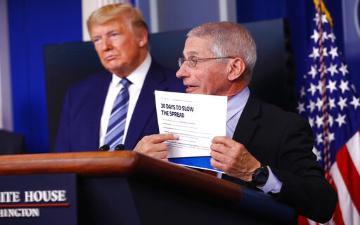
Photo credit:Patrick Semansky/ASSOCIATED PRESS
Ann Skeet is the senior director of Leadership Ethics at the Markkula Center for Applied Ethics at Santa Clara University. Views are her own.
“If I had to reduce the responsibilities of a good follower to a single rule, it would be to speak truth to power.” – Warren Bennis
There’s a lot of emphasis on leadership in society and certainly at moments of crisis, like this one. What is standing out, and serving humanity in a time of great need, is ethical followership.
Our confidence in one another, and humanity broadly, is being restored one example of ethical followership at a time. Followership is a concept explored by scholars like Robert E. Kelley, at Carnegie Mellon, amongst others. Ethical followers are independent thinkers with a positive mindset. They do not blindly follow the decisions or actions of someone in a leadership position without evaluating and understanding them on their own. They can succeed without a leader being present.
Followership is a concept that dovetails nicely with research from the Markkula Center for Applied Ethics at Santa Clara University and the University of Deusto, the Jesuit university in Bilboa, Spain, which also has an ethics center. We learned that the presence of certain conditions in organizations promotes ethical decision making. One of those conditions is the presence of a climate of trust and respect for individual moral autonomy. Fundamental to this belief is that others can use their own moral judgment to arrive at an ethical conclusion. This reinforces the wisdom of distributing decision making about ethics as broadly as possible, and encourages training all employees, not just those in ethics and compliance, in ethical decision making.
So, what we have here, in the midst of a pandemic, is an abundance of examples of moral autonomy and ethical followership. People are making great decisions about who to listen to and follow. In the United States, Dr. Anthony Fauci has emerged as the leader whom followers have chosen. There are others with institutional leadership roles that might be more logical choices, like the head of the Center for Disease Control. But in Dr. Fauci, followers see his bravery and expertise. Dr. Fauci has been willing to calmly and clearly disagree with elected officials. He has confidence in his understanding of infectious diseases, and shares it plainly.
At 79 years old, Dr. Fauci is as vulnerable as anyone. It is an act of courage, therefore, to continue appearing in public meetings on a variety of news outlets when he is in a high-risk category due to his age. Followers see this courage, following his bravery in speaking out. They appreciate his knowledge base. They have chosen to follow him.
Followers are also rallying around individual acts of adjustment and adaptability reflecting the gifts of life. They are drawn to compassion and acts of kindness. For followers, humanitarianism is relevant, important. People are focused on equality, sure. Let’s help everyone. But they are more focused on equity. Let’s make sure the outcomes for all are fair. Followers figured out quickly, perhaps more quickly than some in leadership positions, that health care workers needed more care. Not just because they can keep us all safe, but because they deserve a fair shot at surviving and returning to their families and their exposure has been greater than most.
Followers are welcoming the pause. They are finding the silver linings in a hushed moment and following people they see using positive frames of mind. They are reveling in gratitude for what they do have and becoming more vocal about expressing it for others.
Followers are putting a premium on the truth. It’s having a bit of a comeback, the truth is, after various social media platforms have fooled themselves into believing there can be alternative facts. Even when the news is hard and bad—maybe especially when the news is hard and bad—people understand it and accept it when it is given to them in a straightforward manner. Truth is the foundation of trust. Without trust, society does not exist. Followers seem to grasp this.
Many different cultures are tangling with this foe, Covid-19. They are all going about it differently, honoring the norms of their locale, and, in some cases, forging new norms. When I look at where the virus has been tamed, at least a bit, it seems to be in places where people have learned the value of followership. Now it’s up to the rest of us to follow as ethically as we can; to follow bravery, courage, expertise, humanitarianism, compassion, equity, and truth. In followers, I trust.
